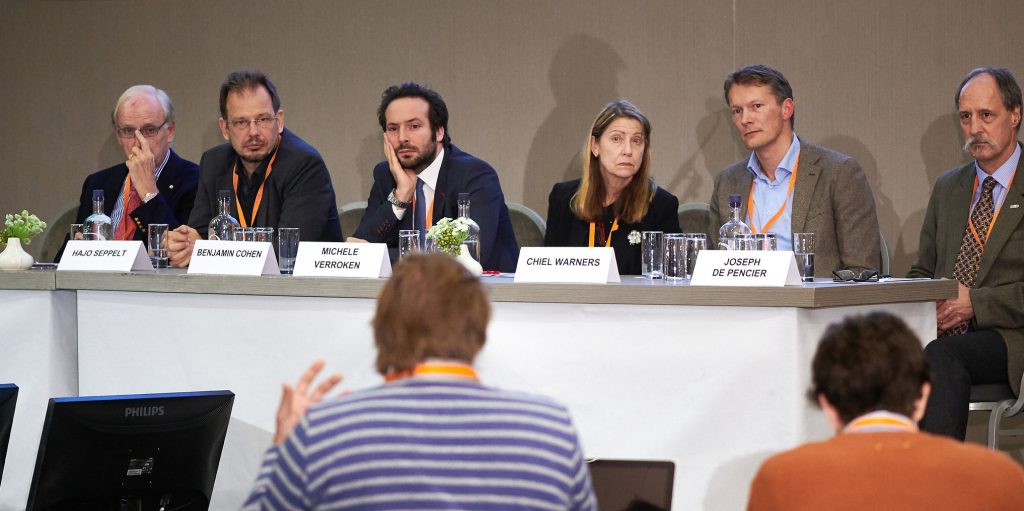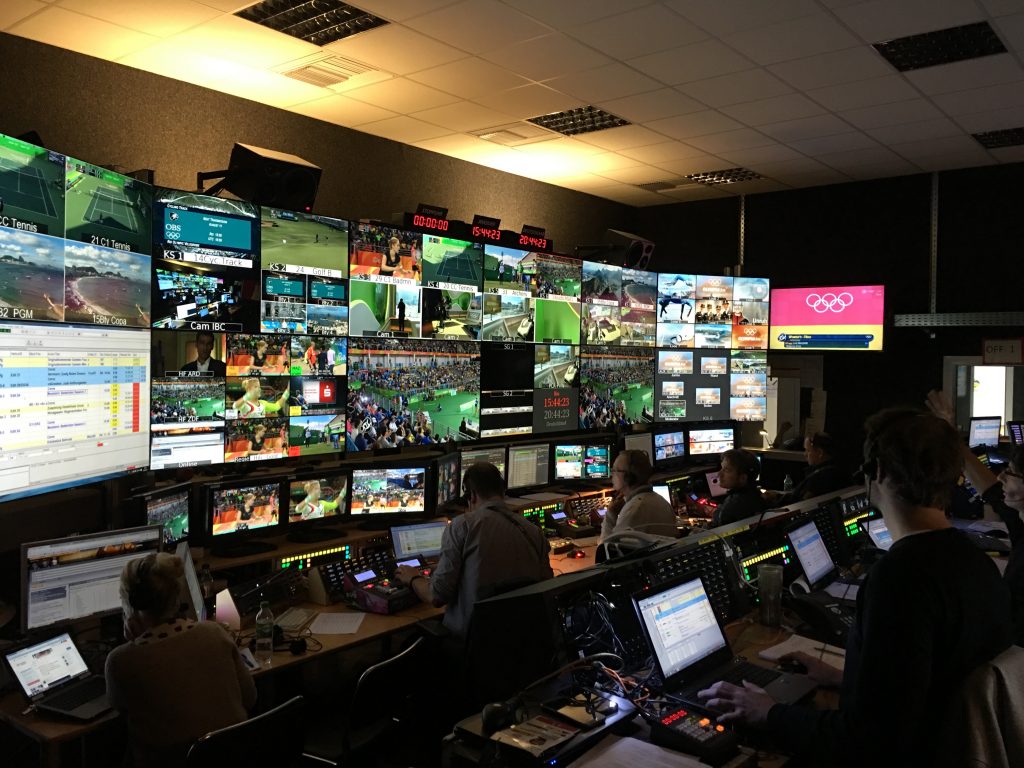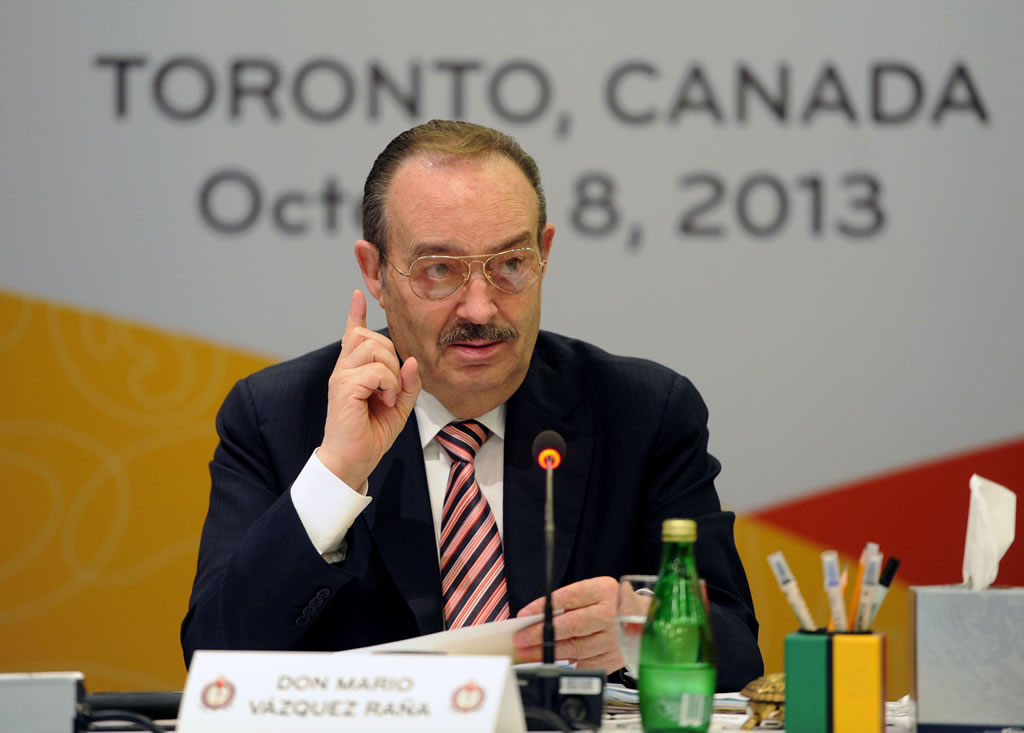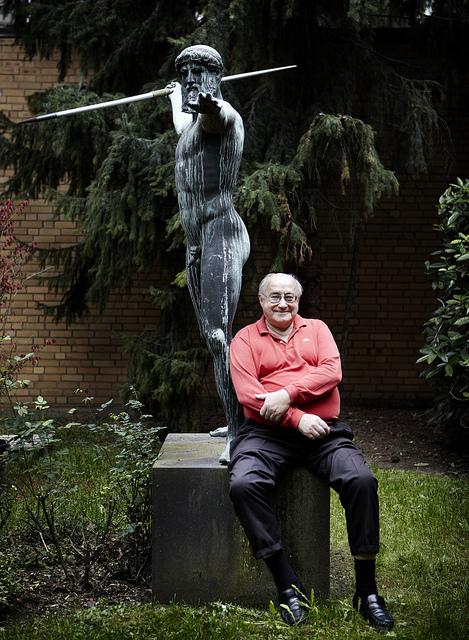Classics „Korruption im Sport“
- SPORT & POLITICS Classics
- Der erste Sammelband zur Korruption im Sport
- Ein Stück Sportgeschichte – wieder aufgelegt
- 322 Seiten im pdf-Format
- Erstveröffentlichung 2006, Forum Verlag Leipzig
ALPENSIA. Vor ein paar Stunden trafen wir im Intercontinental Hotel das IOC-Ehrenmitglied Issa Hayatou, den langjährigen FIFA-Vizepräsidenten und zwischenzeitlichen FIFA-Boss,…
Ich wünsche allen Besuchern von Herzen ein gesundes und angenehmes neues Jahr.
Die Pause hier hat ein Ende, lassen Sie sich überraschen. Noch müssen Versprechen eingelöst werden, und auf diesem Wege hat sich einiges getan. Bevor wir uns also gemeinsam alten und neuen Projekten widmen und weiter über weltumspannende olympische Kriminalität und über die spannungsreichen Mega-Events des Jahres 2018 debattieren, möchte ich kurz an die wunderbare Konferenz Play the Game vor einigen Wochen in Eindhoven erinnern.
[caption id="attachment_30380" align="aligncenter" width="1024"] Foto: Thomas Søndergaard/Play the Game[/caption]
Foto: Thomas Søndergaard/Play the Game[/caption]
Play the Game war wieder einmal ein Festival der Aufklärung und des Journalismus. Ein im weltweiten Olympiabusiness unvergleichliches Angebot, das ich in diesem Theater seit 2007 empfehle (u.a. hier geht es zu den Magazinen vergangener Konferenzen), und das nicht nur als langjähriges Mitglied der PTG-Programmkommission, sondern einfach auch als Dauergast seit der zweiten Konferenz im Jahr 2000, als jemand, der sich diesem Netzwerk verschrieben hat und dafür belohnt wurde mit großartigen Freundschaften, Ideen, Wissen und Mutmachern aller Art.
Inzwischen sind die meisten Präsentationen aufgearbeitet und stehen online zur Verfügung. Videos der größeren Sessions gibt es ebenfalls – lassen Sie sich informieren und inspirieren. Unbedingt!
Als erste kleine Serviceleistung im neuen Jahr: die Präsentationen aus Eindhoven:
 Hauptregie des Olympiateams von ARD und ZDF[/caption]
Hauptregie des Olympiateams von ARD und ZDF[/caption]
BARRA DA TIJUCA. „Sie genießen hier ein Privileg“, sagt Gerd Gottlob. Zugang zu den heiligen Hallen des deutschen öffentlich-rechtlichen Fernsehens wird nicht jedem gewährt. Ein Mann von Sport-Bild war wohl vorher schon da, in der zweiten Etage des International Broadcasting Centers (IBC) am Rande des Olympic Park in Barra. Nun ich. Gerd Gottlob, Sportchef des Norddeutschen Rundfunks (NDR) und Teamchef der ARD in der letztlich gemeinsamen, rund 480 Personen starken und Dutzende Millionen Euro teuren Olympia-Expedition, macht keinen Hehl daraus, dass ihm der Besuch ein gewisses Unwohlsein bereitet. Ging mir nicht viel anders. Zu viele Blicke bei der Führung durch die wichtigsten Arbeitsräume – und dort arbeiten verdammt viele Menschen. Unter Beobachtung.
 Don Mario Vázquez Raña (Foto: PASO)[/caption]
Don Mario Vázquez Raña (Foto: PASO)[/caption]
Da ist es nur noch einer aus dem einst so mächtigen Latino-Quartett, das den olympischen Weltsport ein Vierteljahrhundert beherrschte und viel länger prägte. Nach Primo Nebiolo († 1999) und Juan Antonio Samaranch († 2010) starb Don Mario Vázquez Raña am Sonntagmittag in Mexico City. Er wurde 82 Jahre alt, hinterlässt eine Frau, fünf Kinder, zahlreiche Enkel und eine große olympische Geschichte.
Don Mario, Medien-Tycoon, ein líder del olimpismo, ein Freund Fidel Castros. Ein Vertrauensmann der IOC-Präsidenten Samaranch und Jacques Rogge. Und einst auch ein Partner von Horst Dassler.
Bleibt Jean-Marie Faustin Goedefroid de Havelange, João genannt, der am 8. Mai seinen 99. Geburtstag feiert und im kommenden Jahr als 100-Jähriger die Olympischen Spiele in seiner Heimatstadt Rio de Janeiro erleben will.
Auf nach Aarhus! When the Play the Game conference 2013 opens its doors, it will be in Play the Game’s…
Ich bin auf dem Weg nach Dänemark. Bis Freitag findet an der Universität Aalborg die 20. EASM Konferenz statt. EASM…
ZÜRICH. Es sind Feiertage. Viel Zeit zum Lesen. Einiges möchte ich empfehlen, oder wie das hier standesgemäß heißt: befehlen!
Seit einigen Tagen ist das Magazin der Play the Game Konferenz 2011 in Köln fertig. Viel Vergnügen:
My lonely fight in favor of an honest sport has cost me too much, lawyers fees, trips, publications, justice fees, and the persecution of loyal creditors, that now are executing me and some other FAV members, has ruined me, my patrimony and my health.
Mario Goijman, Whistleblower

Mario Goijman, Köln 2011, Foto: www.playthegame.org, Tine Harden
Es gäbe unendlich mehr zu sagen als das, was ich für einige Medien zusammengefasst habe. Die unendliche Geschichte des Mario Goijman raubt mir den Atem. Einmal mehr zeigt sich, wie die Parallelgesellschaft Sport funktioniert: Whistleblower werden geächtet.
Ich habe Mario Goijman viel zu verdanken, das habe ich im Laufe der Jahre hier mehrfach erwähnt. Seine Präsentation auf der Play the Game Konferenz 2005 in Kopenhagen hat mich lange weinen lassen. Und sie hat mir, so merkwürdig es klingt, Kraft gegeben. Denn Goijman, der kein Journalist ist, hat Journalisten weltweit gezeigt, wie weit man mit Recherche kommen kann. Er hat eine Wahrheit erzählt über die verruchte Branche, er hat unglaubliche Dokumente vorgelegt (leider ist seine Webseite www.volleygate.com inzwischen abgeschaltet). Ich finde, Journalisten können sich an Goijman ein Beispiel nehmen. Das klingt alles ziemlich pathetisch. Egal. Man kann die Geschichte gar nicht oft genug aufschreiben. Mario Goijman braucht Hilfe.
ZÜRICH. Zwischendurch mal in meinem broken English: New revelations: FIFA Excecutives named as ISL bribe-takers Three days before the election…
Mein Freund und Kollege Jens Sejer Andersen hat vergangene Woche an der Universität Antwerpen einen Vortrag zu einem ewig aktuellen (und derzeit wieder brandaktuellen) Thema gehalten, den ich gern veröffentliche. Es tauchen viele der üblichen Verdächtigen und alten Bekannten auf, ob nun der Handball-Pharao, Ruben Acosta oder Jean-Marie Weber. (Aus Zeitgründen muss ich leider weitgehend auf Verlinkungen verzichten, zu allen gibt es im Blog etliche Geschichten.)
Voilà:
The Magicians of Sport: How the Greatest Corruption Scandal in World Sport Vanished Before We Knew It Existed
By Jens Sejer Andersen
International Director and founder, Play the Game
Usually, I am a great admirer of magicians. People who can make elephants appear out of nowhere or escape from underwater cages hand-cuffed and wrapped in chains, really deserve respect.
There are, however, some magicians that we should beware of, and quite a few of them do their tricks in sport. I am not referring to artists like Lionel Messi or Justine Henin who can make unimaginable things with a ball. No, the magicians I would like to talk about are exercising their witchcraft more discreetly.
They do not seek our admiration over their skills. On the contrary: They shun the public eye so much that they have become experts in one aspect of magic: They know how to make us look in one direction while they do their work in the other direction, and more than that, when we look back we do not even notice something mysterious has happened.
Thanks to these magic abilities, a number of corruption scandals in the highest ranks of sports leadership continue to vanish, even before we realise that they actually exist.
Where were for instance your eyes looking in late June this year? I suppose that they, like mine, were directed at a flat screen TV to follow the last matches in the group stage of the FIFA world cup in South Africa.
Abracadabra! While we were staring on one of the greatest shows on earth, the biggest corruption scandal ever documented in sport disappeared out in the blue.
Did you notice?
If not, don’t feel ashamed. It was not meant for you to see.
While events in South Africa spellbound the world, a dry and formal sheet of paper was produced more than 8,000 kilometres away, by the public prosecutor in Zug, the Swiss canton in which FIFA resides.
On the 24 June, the prosecutor ended eight years of legal proceedings with a statement that put an end to the so-called ISL-affair.
Simultaneously, FIFA noted in a very brief media release “FIFA is pleased that the prosecutor of Zug has finalised his investigations�?.
FIFA had reasons to be satisfied indeed. For although the Swiss prosecutor that day confirmed that FIFA officials had received millions of Swiss francs from the ISL company and kept them in their pockets, and that FIFA should pay a compensation of 5,5 million Swiss francss – around 4 million euros – things could have turned out much worse for football’s governing body.
The collapse of a marketing giant
For the ISL was no street vendor of services to FIFA. ISL stands for International Sport and Leisure and was from the early 1980’ies and until its collapse in 2001 by far the biggest sport marketing company in the world. It was founded by the Horst Dassler, whose family owned Adidas.
ISL bought TV and marketing rights from the international sports federations and the International Olympic Committee and re-sold them to media companies and private sponsors. Thanks to its close personal relations to FIFA and other big federations it became a driving force in the explosive commercialisation of elite sport.
However, even a booming company in a booming sector can make mistakes, and in 2001 the ISL collapsed because it had seriously overestimated the value of its products.
When the Swiss administrators took over the bankrupt ISL and started looking at the internal papers, they soon discovered some strange payments. In the first place, the liquidator of the company, Thomas Baur, found that at least 3,5 million Swiss francs (at the time 2,2 million euros) had been paid out in personal commissions and they started writing leading sports officials in order to get the money back.
And in 2004, Mr Bauer did get most of that money back. Not in many small portions, but on one big check of 2,5 million Swiss francs. It would of course be interesting where this sum came from and on behalf of which sports leaders it was paid back, but after hard work from a splendid Swiss lawyer, Peter Nobel – the Federal Court, the highest court in Switzerland, ruled that no names should be named.
Peter Nobel is not only an excellent player in the court room – a magician in his field you may say – he was also the man who issued the big check. And, coincidentally perhaps, he has for many years been the personal lawyer of Joseph S. Blatter, President of FIFA.
But this was only the beginning. Other parts of the Swiss justice had an interest in the ISL, and one investigative judge, Thomas Hildbrand, was particularly active, launching firstly one investigation into how six ISL-directors managed their affairs, and secondly another one into the relation between FIFA and the ISL.
138 million Swiss francs in kickbacks
In 2008, the court in the Swiss city of Zug concluded the first of these two cases, the proceedings against six former ISL directors for embezzling large portions of money belonging to FIFA. The legal case itself ended up with acquittals and mild sentences since the defendants could convince the judges that FIFA in reality had accepted the way ISL handled FIFA’s money.
But in the indictment a stunning revelation was brought forward and confirmed by the defendants in the court room:
Over 12 years, from 1989 to its bankruptcy in 2001, ISL handed out no less than 138 million Swiss francs – then 87 million euros – in personal commissions to sports leaders in order to get lucrative TV and marketing contracts.
The payments were channelled to the private pockets or bank accounts of high ranking sports leaders through an advanced system of secret funds in Liechtenstein and the British Virgin Islands. Some of the kickbacks were handed over personally by the top executive of the ISL, Jean-Marie Weber, who travelled around the world with a suitcase filled with cash.
Bribes as salaries for sports leaders
According to the defendant ISL directors, these payments were a normal and integral part of the daily sports business and a precondition if ISL wanted to sign contracts with their customers.
“I was told the company would not have existed if it had not made such payments,�?
said former chief executive of the ISL Christoph Malms, and was backed the former director of finances, Hans-Jürg Schmid.
“It was like paying salaries. Otherwise they would have stopped working immediately�?,
he said about the sports officials.
How come that the six directors admitted these secret personal commissions so freely? The answer is simple. In Switzerland this kind of kickbacks or bribes were not criminal until new anti-corruption legislation was passed in 2006.
And although the directors were quite open-mouthed, they did not risk their future career by dropping names in the court.
We only know that when ISL flourished, some of its most important customers besides FIFA were the ATP in tennis, IAAF in athletics, FINA in swimming, FIBA in basketball and for some years also the IOC.
You would perhaps expect that these organisations did react to the revelations in Zug by tracing corrupt sports leaders in their own ranks or at least distancing themselves publically from such malicious practices.
But no: From the international sports community there has only been one reaction to what is beyond comparison the biggest known corruption scandal in sport: Unanimous and complete silence.
After the verdicts in Zug 2008, there was still a hope: Perhaps the third and last criminal investigation could help us answer the simple question: Who took the bribes?
How much did they get each? – after all, 87 million euros is a lot of money, and not that many persons were in charge of TV and marketing contracts. Do these persons still hold important positions in sport?
Unfortunately, the end of the ISL affair this summer did not answer any of these questions.
The settlement does confirm what FIFA has long denied: That FIFA officials have taken millions of Swiss francs from the ISL in return for contracts. And it does oblige FIFA to pay back some of the money stolen from sport.
But even if we assume that all cheques have been paid by FIFA: 2,5 million Swiss francs to the liquidators, 5,5 million Swiss francs in the recent decision plus the costs of the legal procedure – we are still far from the impressing 138 million Swiss francs that went with the corruption. The financial balance is clearly in favour of those who cheated.
Before I go deeper into analysing the mechanisms that allow such a huge scandal to run almost unnoticed by the world public, one more important question arises from the ISL case:
Is the magic over?
Did corruption in sports organisations die with the ISL in 2001, and is the buying and selling of TV and marketing rights now a clean business?
No answers given at Olympic congress
I raised this question during a session about “Good governance and ethichs�? at the Olympic Congress in Copenhagen last year where over 1,200 high ranking sports officials gathered to discuss the challenges to sport. The answer from the moderator, Youssoupha Ndiaye from the IOC Ethics Commission, was easy to understand:
“The panel does not answer questions�?.
To be fair, the audience was quite amused by that response. Well, perhaps not all – probably not the man sitting a few rows from me, Jean-Marie Weber, the man who once travelled the world with a suitcase full of money.
I do not know which tasks the elegant Weber had at the Olympic Congress, but it cost the IOC President Rogge some sweat explaining Weber’s presence. It was apparently not the IOC itself that had invited him, but to get an accreditation through the strict security measures of that meeting you had to have very good connections in the so-called Olympic family of sport.
Bitte schon mal vormerken: Die Konferenz Play the Game findet 2011 erstmals in Deutschland statt. Etwas kürzer als sonst (und…